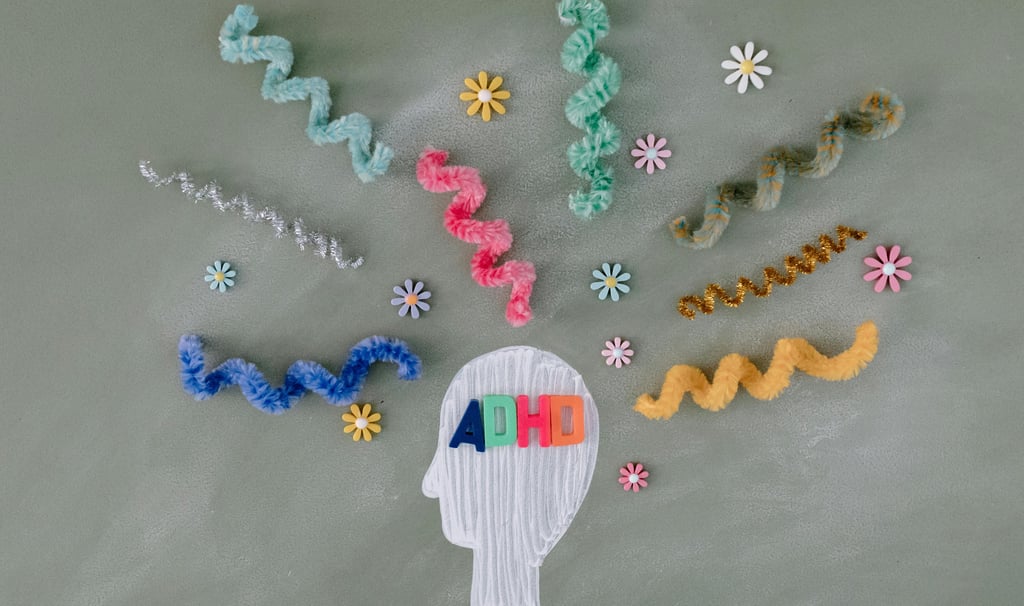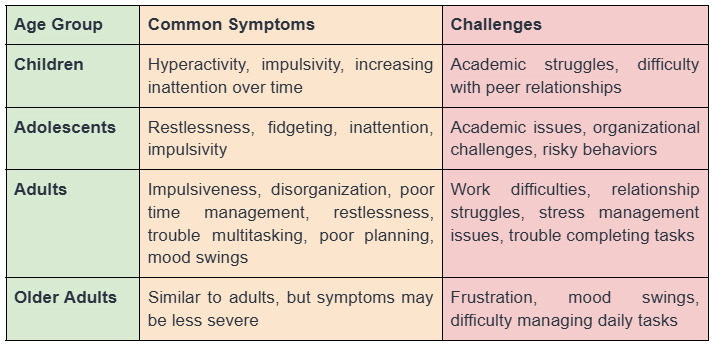ADHD Symptoms, Causes & Treatment: What You Need to Know
Understand ADHD symptoms, causes, and treatments for children and adults


Attention-Deficit/Hyperactivity Disorder (ADHD) is a neurodevelopmental condition characterized by persistent symptoms of inattention, hyperactivity, and impulsivity. While commonly associated with children and adolescents, ADHD also affects adults, often in ways that impact daily life, relationships, and professional performance.
Understanding ADHD
ADHD symptoms begin in childhood, typically before age 12, and can interfere with social relationships, academic progress, and work productivity. While hyperactivity may decrease with age, difficulties with impulsivity, restlessness, and attention often persist into adulthood. Many individuals remain undiagnosed until later in life, leading to challenges in personal and professional spheres.
Types of ADHD
There are three primary types of ADHD:
1. Predominantly Inattentive Presentation
Struggles with focus, organization, and task completion
Easily distracted and forgetful
Avoids mentally demanding tasks
Frequently loses essential items
Makes careless mistakes and has trouble following instructions
2. Predominantly Hyperactive/Impulsive Presentation
Displays excessive movement and restlessness
Fidgets, has difficulty staying seated, and is always "on the go"
Acts without thinking, leading to impulsive decisions
Interrupts conversations, talks excessively, and struggles with turn-taking
3. Combined Presentation
Exhibits symptoms of both inattentive and hyperactive/impulsive types
Diagnosis is made when criteria for both categories are met
What Causes ADHD?
The exact cause of ADHD is still unknown, but research suggests multiple contributing factors, including:
Genetics – A strong hereditary component
Brain Injuries – Possible links to neurological differences
Nutrition – The role of diet and early childhood health
Social Environments – The impact of upbringing and external stimuli
ADHD Diagnosis Criteria
Diagnosis criteria vary by age:
Children (up to 16 years) – At least 6 symptoms of inattention, hyperactivity, or impulsivity
Teens and Adults (17+ years) – At least 5 symptoms of inattention, hyperactivity, or impulsivity
Symptoms and Challenges of ADHD Across Different Age Groups:
Can I Self-Diagnose for ADHD?
ADHD diagnosis criteria should serve as a guideline rather than a tool for self-diagnosis. Many people may relate to some ADHD symptoms, such as forgetfulness, restlessness, or difficulty focusing, but that does not necessarily mean they have ADHD.
A proper diagnosis requires a comprehensive evaluation by a qualified mental health professional. This typically involves:
Clinical Interviews – A psychologist or psychiatrist will assess a person’s history, behaviors, and challenges across different settings (home, school, work, etc.).
Standardized Assessment – Tools like the ADHD Rating Scale or DIVA-5 (for adults) help measure symptom severity.
Corroborative Information – Input from teachers, family members, or close friends provides a broader perspective on symptom patterns.
Rule Out Other Conditions – Anxiety, depression, learning disabilities, and even sleep disorders can mimic ADHD symptoms.
This is why self-diagnosis or online tests alone are not enough.
Treatment for ADHD
Effective treatments can help manage symptoms and improve quality of life. Common approaches include:
Medication – Stimulant and non-stimulant options to improve focus and impulse control
Psychotherapy – Counseling, cognitive-behavioral therapy (CBT), and ADHD coaching (e.g., time management strategies, structured routines, mindfulness techniques)
Behavioral Interventions – Parent training, school-based support, and workplace accommodations
Final Thoughts
ADHD is a lifelong condition that affects individuals differently at various stages of life. Early diagnosis, proper management, and a supportive environment can significantly enhance the well-being of those with ADHD. If these symptoms sounds familiar you or your loved one, book an appointment today with Mind Wave’s therapists to assist you on an ADHD assessment!
References:
American Psychiatric Association. (n.d.). What is ADHD?
National Institute of Mental Health. (n.d.). Attention-deficit hyperactivity disorder: What you need to know.
Centers for Disease Control and Prevention. (n.d.). Attention-deficit/hyperactivity disorder (ADHD). U.S. Department of Health & Human Services.




